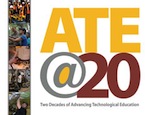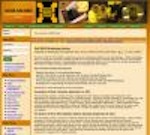
ATE@20 Featured Blog Post and Survey Results
Last week on the ATE@20 Blog,
Madeline Patton provided an update on the overall reception of the
ATE@20 book + blog project. She also provided a look at the
results of the usage survey to which so many of you graciously
responded. While we hope you’ve had a chance to read through the
post yourselves, here is a brief review of what you can find on
the site:
-
Released at the 20th National ATE Principal Investigators
Conference last October, ATE@20: Two Decades of Advancing
Technological Education offers a glimpse into the
discoveries and opportunities generated by Advanced
Technological Education projects and centers during the past two
decades.
-
A recent survey of readers found that in the four months after
the book was released at the ATE Principal Investigators
Conference in October 2013, its content has been reused and
shared to reach key audiences beyond the ATE community. ATE
Central will continue to gather feedback in the coming months,
and Principal Investigator Rachael Bower encourages anyone who
has read the book to participate in the survey at
https://atecentral.net/ate20survey.
-
Student innovations and successes are a pivotal indicator of
ATE’s impact on community and technical college education
throughout the past 20 years. To highlight these
accomplishments, the book contains human interest stories about
several ATE program graduates.
-
Nearly half of the people who responded to the ATE@20 usage
survey (which was sent in February to people who requested and
received copies of the book) reported that they had used
portions of the book in presentations, promotional materials,
social media posts, newsletters, or blogs.
-
Most of the respondents (65%) are ATE project or center
principal investigators. Others who participated in the survey
include community college educators who do not have ATE grants,
community college administrators, ATE project or center staff
members, high school guidance counselors, and a member of an
ATE national visiting committee.
For the full story, including an overview of the ATE@20 book and
comments shared by survey respondents, check out the
ATE@20 blog!



